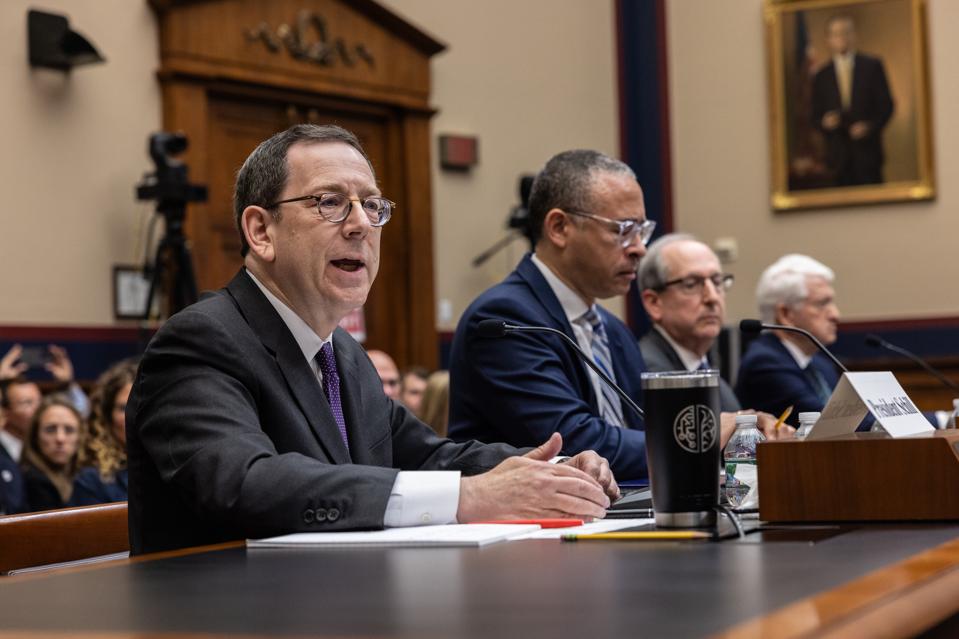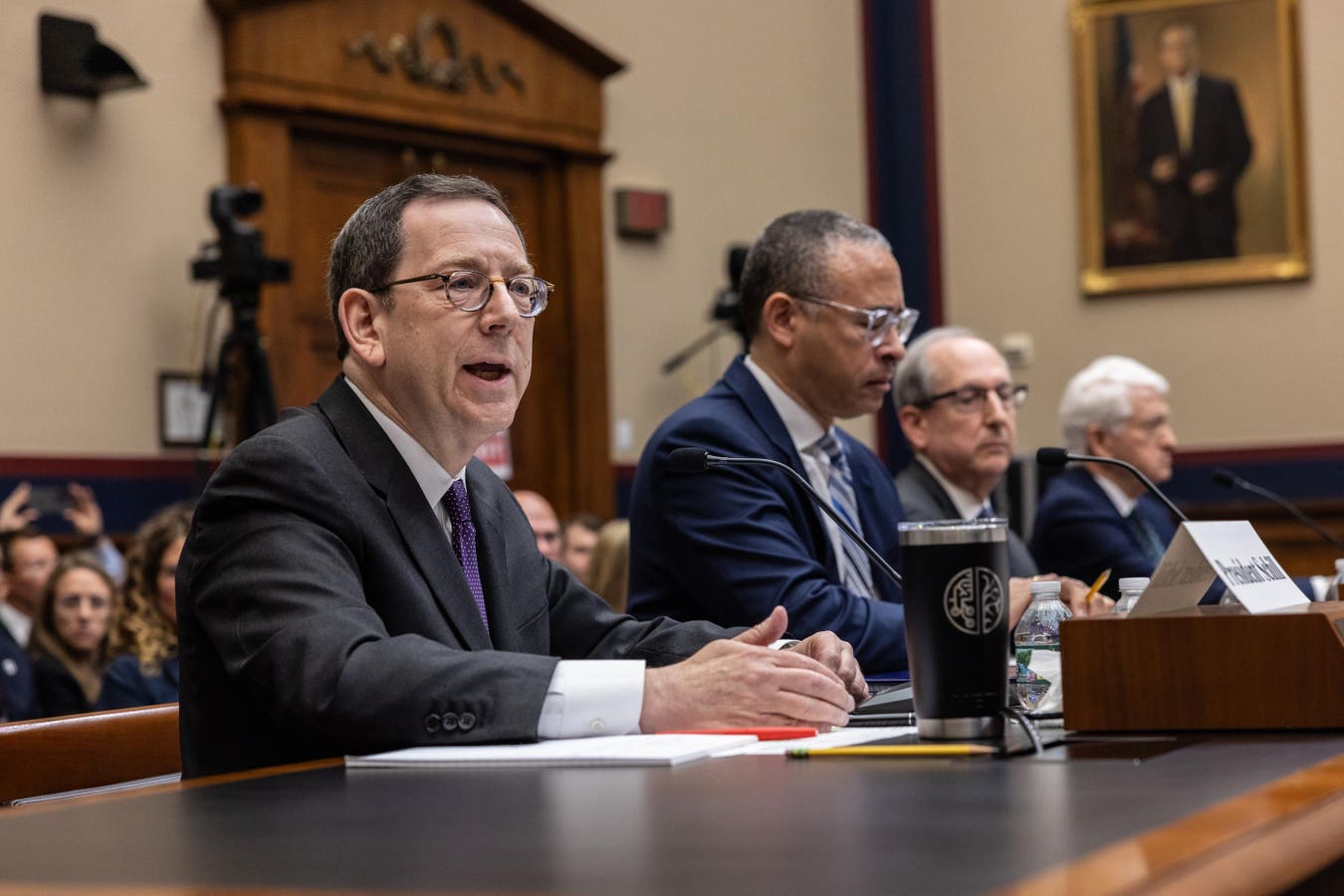
Northwestern University President Michael Schill, shown here on the left during a 2024 House Committee on Education and the Workforce hearing, has announced he will step down. Anna Rose Layden/Bloomberg
© 2024 Bloomberg Finance LP
Northwestern University’s Michael Schill announced Thursday that he will step down from the presidency of the institution, ending a three-year tenure that saw accomplishments in several areas, including almost $2.5 billion in fundraising, a number of major construction projects, and the establishment of several new academic and research centers at the school.
But Schill was also dogged by numerous high-profile controversies, funding freezes, budget woes and harsh attacks from congressional Republicans who sharply criticized him for his handling of pro-Palestinian campus protests last year and for failing, in their opinion, to do enough to protect Jewish students during those demonstrations. In the end, all those problems took their toll.
“As I reflect on the progress we have made and what lies ahead, I believe now is the right time for new leadership to guide Northwestern into its next chapter,” Schill said in his message. “Therefore, I have decided, in consultation with the leadership of the Board of Trustees, that I will step down as President.”
Since being named Northwestern’s president in 2022, Schill has faced numerous challenges, including a hazing scandal in the athletics department and the ensuing firing of football coach Pat Fitzgerald, who — along with several players — sued the university over his firing. The university settled that lawsuit in August for an undisclosed amount.
The university has also had to contend with substantial budget difficulties. In February, Schill and other campus administrators announced a series of spending controls, including a change to employee benefits, a hiring freeze, a 10% reduction in non-personnel expenses, and a suspension of annual compensation increases.
In April, the Trump administration froze $790 million in federal funding for Northwestern, part of its expanded crackdown on several nationally prominent universities for what it claims were various civil rights violations at those schools. That led to further budget cuts at the university, including the elimination of more than 400 staff positions.
Schill alluded to the federal tensions in his announcement, saying, “I also recognize that difficult problems remain, particularly at the federal level. It is critical that we continue to protect the University’s research mission and excellence while preserving academic freedom, integrity, and independence.”
But Schill’s most widely publicized problem was the withering criticism he faced over campus protests and the ensuing deals he made with the protestors. Following days of demonstrations and unsuccessful attempts to break up a campus encampment last spring, Northwestern officials reached an agreement with protestors that required them to dismantle the encampment. In exchange, the university committed to several concessions, including re-establishing an Advisory Committee on Investment Responsibility and promising more support for visiting Palestinian faculty and students.
In an op-ed published in The Chicago Tribune, Schill explained why he chose to negotiate with the protesters. After citing his own Jewish heritage, he concluded with “This resolution — fragile though it might be — was possible because we chose to see our students not as a mob but as young people who were in the process of learning. It was possible because we tried respectful dialogue rather than force. And it was possible because we sought to follow a set of principles, many of which I would argue are core to the tenets of Judaism.”
But Schill’s perspective was roundly condemned by many observers. The American Jewish Committee of Chicago castigated Northwestern for “succumbing to the demands of a mob which has intimidated Jewish students, espoused antisemitic, hate-filled speech, and whose members have celebrated Hamas terrorists.”
Along with several other presidents of prominent universities, Schill faced a grilling by the House Committee on Education and Workforce last year over their leadership of the institutions during the protests. He was hauled before the same committee this August for additional testimony about antisemitism on campus.
The fate of those university presidents testifying before Congress, along with others facing criticism from the Trump administration, has been the topic of much public scrutiny. With Schill’s exit, six high-profile former campus leaders have now resigned over those pressures. The others are Claudine Gay (Harvard), Minouche Shafik (Columbia), Jim Ryan (University of Virginia), Liz Magill (University of Pennsylvania) and Jonathan Holloway (Rutgers).
Republican lawmakers celebrated the news of Schill’s departure. Rep. Elise Stefanik praised the news on social media as “LONG overdue,” charging that Schill had failed to protect Jewish students and “caved to the demands of the antisemitic, pro-Hamas mob on Northwestern’s campus.”
Michigan Rep. Tim Walberg, who chairs the House Education and Workforce Committee, said Schill “will leave behind a legacy of not only failing to deter antisemitism on campus but worsening it. Northwestern’s next president must take prompt and effective action to protect Jewish students from the scourge of antisemitism.”
However, Northwestern Board of Trustees Chair Peter Barris praised Schill for his leadership. “The Board of Trustees is enormously grateful to President Schill for his leadership during a period of unparalleled challenges at Northwestern and across higher education,” said Barris in a statement. “In spite of many headwinds, President Schill and his administration worked diligently to defend Northwestern’s mission and accomplished lasting achievements that contribute robustly to Northwestern’s continued advancement among the great universities in the United States and around the globe.”
The Board said it will name an interim president soon. Schill will remain in his role until the interim president starts. He also will continue to work with the Board of Trustees to get the university’s frozen federal funding restored. Schill plans to take a sabbatical from the University, before returning as a faculty member at the Northwestern Pritzker School of Law.

